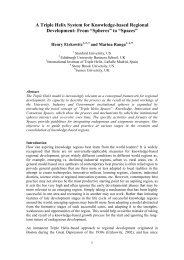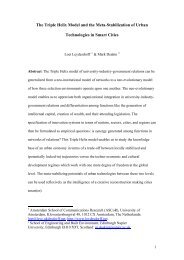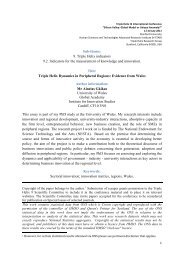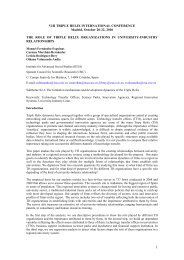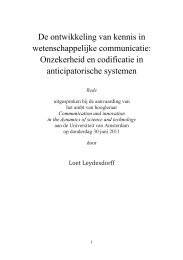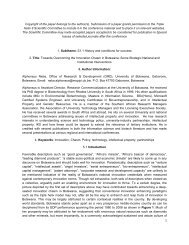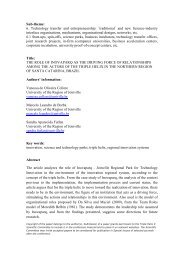TRIPLE HELIX noms.pmd
TRIPLE HELIX noms.pmd
TRIPLE HELIX noms.pmd
Create successful ePaper yourself
Turn your PDF publications into a flip-book with our unique Google optimized e-Paper software.
O-079Universities and Economic Development Activities – a UK RegionalComparisonMoira Decter, Frank Cave, MaryRose, Gill Peers, Helen Fogg, Sue Peters, Institute for Entrepreneurship and EnterpriseDevelopment, Lancaster, UKIntroductionIn the UK, a number of universities engage in economic development or regeneration activities and this can, in some cases,form the majority of their knowledge transfer (KT) work. Economic development activities have been funded in the UK by theEuropean Union (EU) through the European Regional Development Fund (ERDF) and UK Regional Development Agencies(RDAs) since the late 1990s. However, the amount of funding available is dependent on the level of economic deprivation in subregionalareas. This difference in funding has led to disparate experiences in different regions of the UK and in the context of thispaper, very different responses from universities.Another unusual feature of such university economic development work is that the links between industry, government and theuniversity are via a funding model that sees government at regional or European level providing funding directly to the university.This funding requires the university to meet targets associated with support of small to medium sized enterprises (SMEs).Within de minimis regulations, this support is often free of charge for the SMEs involved.This study compares two regions of the UK, the North West and the South East of England. In addition to the effect of funding;geographical, historical and cultural influences on university behaviour with respect to economic development activities in theirregion are considered.State of the Art about the TopicThe UK academic literature relating to direct knowledge transfer from universities is relatively sparse and often utilizes descriptivemethodologies and/or analysis of survey results. This literature tends to examine entrepreneurship, particularly spin-out companyformation, amongst UK academics. Government reports look for overall trends and classifications of university types which areunrelated, and possibly irrelevant, to university knowledge transfer behaviour. There is no evidence of published research whichattempts to examine the patterns of KT at individual universities and the effects on economic development work. There alsoappears to be little use of theory in relation to the choices of individual universities in relation to KT work.Research FocusThe research considers the factors which influence UK universities to engage with economic development activities. The relativelevels of such activities will be established for the individual universities studied. Using these levels of engagement as a startingpoint, the different economic development strategies of universities are explored through their strategy statements and interviewswith KT professionals. Elements of evolutionary theory will be used to explore the reasons for these differences and examplesof some university programmes to illustrate approaches.MethodologyQuantitative data such as regeneration funding, work with regional SMEs and graduate start-up statistics, from the UK governmentHigher Education Business and Community Interaction (HEBCI) Survey, are used to track economic development activity fromuniversities in two UK regions. This provides a basis for understanding the extent of these activities at each institution studied.However, to understand the drivers for universities to engage in this work we need to examine qualitative data. In this casestrategy documents published by each university in compliance with the fourth round of the UK government Higher EducationInnovation Fund (HEIF) are analysed to discern themes relating to economic development work. HEIF 4 strategies are analysedusing Wmatrix, a software tool for linguistic analysis through corpus comparison. Wmatrix is a data-driven approach to linguisticanalysis. Interviews with KT personnel at universities in the two regions provide further insight into the direction of KT programmesat universities.Brief case studies of programmes developed using research findings at one university in the North-West of England are presented.Leading Enterprise and Development (LEAD) and Innovation for Growth (IFG) have been developed by the Institute forEntrepreneurship and Enterprise Development (IEED) at Lancaster University. LEAD aims to contribute to raising regionalproductivity, competitiveness and skills by addressing issues of leadership within the context of the SME sector generally andin particular in the owner-manager’s business. IFG, a new programme, which aims to drive both product and process innovationinto SMEs, takes IEED experience utilising models of SME engagement and incorporating feedback taken from SMEs. Bothprogrammes have been built on the innovation research emerging from the Management School.Madrid, October 20, 21 & 22 - 201069



